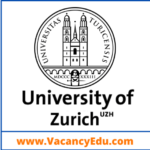University of Liverpool, Liverpool, England invites online Application for number of Fully Funded PhD Degree at various Departments. We are providing a list of Fully Funded PhD Programs available at University of Liverpool, Liverpool, England.
Eligible candidate may Apply as soon as possible.
(01) PhD Degree – Fully Funded
PhD position summary/title: Multiphysics data-driven validation framework for component qualification in fusion
In a nuclear fusion reactor Plasma Facing Components (PFCs) are subjected to extreme environmental conditions which induce complex loads. To build confidence in the integrity of PFCs and consequently a robust operation of a reactor, we must test individual components under the complex multi-physics loads representative of the operating conditions. It is expensive, time consuming and difficult to physically test the components under the extreme environmental conditions, making it desirable to enable the use of virtual tests, e.g. engineering simulations, to qualify these components. However, simulations require validation against experimental data over domains that can be physically tested to ensure that they are credible and can be used for risk informed decision making. In this project the student will aim to integrate physical and virtual testing to develop a multi-physics data-driven validation framework, which synthesises data from multiple sensors and demonstrates credibility of an engineering simulation. This project will focus on component qualification in fusion; however, the novel framework will have the potential to extended to other engineering applications based on multi-physics systems.
Deadline : 31 January 2025
(02) PhD Degree – Fully Funded
PhD position summary/title: New approaches to flocculator design in water treatment
Efficient coagulation and flocculation are crucial for the optimal performance of surface water treatment plants (WTWs). Coagulation alters the stability of small particles, causing them to become unstable, while flocculation promotes the agglomeration of these particles through gentle mixing, forming irregularly shaped, loosely bound flocs. Inadequate coagulation or flocculation can lead to poor-quality water entering clarifiers and filters, which may compromise the final water quality and increase operational costs.
The design process for rotating paddle flocculators is largely based on empirical criteria established by Camp [1955] using the average velocity gradient, G, (s−1), (i.e. the square root of average power per unit volume divided by the dynamic viscosity of the water) and retention time, 𝑡 (s).
However, G is an imperfect design parameter. Clark [1985] and Graber [1994] demonstrated that the original derivation of the average velocity gradient value was flawed for three dimensional flows, and consequently it should not be universally applied to different types or sizes of mixer. Different impellers will also produce different performance levels at the same average velocity gradient, and thus the parameter can only be used to scale up flocculation results from stirred tanks with extreme care ([Lai, 1975], [Ducoste, 1998a] and [Ducoste, 1998b]). Despite these historic criticisms, the velocity gradient remains in widespread use.
Deadline : 1 January 2025
View All Fully Funded PhD Positions Click Here
(03) PhD Degree – Fully Funded
PhD position summary/title: Organic Radicals and Diradicaloid for Single-Molecule Electronics and Quantum Information Processing
Recent advancements in nanoscience have enabled the reliable and reproducible wiring of molecules into electrical circuits. In the last few years, organic radicals – molecules with unpaired electrons in their ground-state electronic structure – have emerged as potential candidates for molecular electronic applications in quantum information processing. We have pioneered the synthesis and characterisation of organic radicals as single molecule junctions (Angewandte Chemie 2022), demonstrating their unique promise, along with enhanced, non-ohmic/non-linear charge transport (Angewandte Chemie 2024), and with very interesting transistor-like behaviour. However, there are still challenges and unknowns that we want to tackle and explore.
With this project, we want to focus on non-Kekulé radicals: conjugated hydrocarbon that cannot be assigned a classical Kekulé structure. These materials are reactive and tend to decompose at room temperature, but we have developed several strategies towards the isolation of bench-stable derivatives which will be applied in this work.
Deadline : 30 September 2025
(04) PhD Degree – Fully Funded
PhD position summary/title: Putting a brain in the mobile robotic chemist
A fully funded PhD studentship is available in the area of computational chemistry/robotics in a chemical laboratory focusing on the development of the algorithmic infrastructure that underpins them.
The overall goal of the Cooper group is to revolutionize the way that new materials are discovered by combining computational simulations, machine intelligence, robotics, and materials synthesis. A central problem is the enormity of the potential chemical search space, and better navigation of this space is a grand scientific challenge for our times. There are two possible solutions: the use of computational design to target better materials and the use of robotics to search the available experimental space much faster. This project brings these two ideas together, building on our recent development of the world’s first mobile ‘robotic chemist’
Deadline : 31 March 2025
(05) PhD Degree – Fully Funded
PhD position summary/title: Research on flexible heat pump technology
In the UK, heat constitutes about half of energy consumption. The government plans to install 19 million heat pumps in homes over the coming decades to achieve net-zero emissions by 2050. However, the current adoption rate of heat pumps in the UK is low, with only 240,000 operational units as of 2020.
Challenges persist for heat pump technologies, particularly in the UK. Most of UK homes are connected to the gas grid, relying on gas boilers as the primary heating method. This poses a challenge as most available heat pumps operate at temperatures lower than what is typically required by the existing high-temperature heat emitters, necessitating costly retrofitting. Addressing these challenges requires innovations to enhance the cost-effectiveness of heat pump products, especially those designed for high temperatures.
The newly developed flexible heat pump technology integrates a heat storage into a conventional vapour compression heat pump cycle to recover, store and reuse the waste heat generated by the heat pump operation. As a result, it can achieve energy efficiency than conventional heat pumps.
In this PhD project, the student will have the opportunity to work on the modelling and experimental research on the flexible heat pump technology. The student will also benefit from close collaboration with industrial partners.
Deadline : 1 August 2025
Polite Follow-Up Email to Professor : When and How You should Write
Click here to know “How to write a Postdoc Job Application or Email”
(06) PhD Degree – Fully Funded
PhD position summary/title: Single-Molecule Electroluminescent Devices as Single-Photon Sources
Recent advancements in nanoscience have enabled the reliable and reproducible wiring of molecules into electrical circuits. A single molecule can be sandwiched between two metallic electrodes (a “molecular junction”) and an electrical current can be driven through, enabling the assessment of their electronic and charge transport properties at the smallest scale possible. As electrons flow through the molecule, a tiny fraction of their energy is slowly and steadily converted into light – single-molecule junctions behave like an extremely small OLED. The structure of the molecule dictates the final properties of the optoelectronic device in terms of emission wavelength and intensity.
With this project, we want to systematically study light emission from single molecule devices, with the aim of developing a molecular, on-demand, single-photon source that can be operated reliably at room temperature.
Deadline : 30 September 2025
(07) PhD Degree – Fully Funded
PhD position summary/title: High-throughput exploration of multicomponent metal organic frameworks (MOFs)
New porous materials are important for advances in key technologies such as carbon dioxide sequestration and storage or catalysts for clean manufacturing. The assembly of multiple metal and organic linkers in the well-defined and complex crystal structures of multicomponent metal organic frameworks (MOFs) will deliver materials with enhanced properties. However, at present we do not have the experimental tools with the scale and speed to efficiently explore the vast chemical space available. This project will harness recent advances in robotics to efficiently explore the discovery of new multicomponent MOFs. The student will design and execute experiments on state-of-the-art robotic synthesis platforms, develop the required measurement approaches to extract and analyse data from the arrays of materials.
Training in robotics, chemistry and structural characterisation will be given. The project will develop protocols to identify materials with potential application gas separation (focusing on capturing carbon dioxide from flue gas and challenging separations of hydrocarbons) and catalysis (transformation of biomass for next-generation clean manufacturing) applications that will focus the large numbers of new materials identified for further detailed exploration. The project is driven by a vision of a future where research scientists will make routine, broad use of robotics as part of the discovery of advanced materials, and thus the project will prepare the student for a wide range of industrial and academic career opportunities.
Deadline : 31 August 2025
(08) PhD Degree – Fully Funded
PhD position summary/title: Studentships in Theoretical Computer Science
We are seeking four talented and enthusiastic students to pursue a fully funded PhD in Theoretical Computer Science in a research area aligned with the University of Liverpool Digital research theme.
Deadline : 31 March 2025
Click here to know “How to Write an Effective Cover Letter”
(09) PhD Degree – Fully Funded
PhD position summary/title: Sustainable synthesis: reaction development and applications in synthesis
A PhD position is available in the group of Professor John Bower at the University of Liverpool (https://bowerresearchgroup.wordpress.com/). The position is funded for 3.5 years and will start in October 2025. The project is aligned with the UoL’s newly formed Centre for Translational Molecular Synthesis, a key aim of which is to enhance interactions between chemists involved in Synthetic Methods Development and Medicinal Chemistry. Informal enquiries should be directed to Professor John Bower (john.bower@liverpool.ac.uk).
Deadline : 31 March 2025
(10) PhD Degree – Fully Funded
PhD position summary/title: What Lurks Beneath: Integrating the physical and chemical signals of magma ascent for enhanced volcanic eruption forecasting
The overall aim of this PhD project is to develop new models of magma intrusion in the crust that can be used to forecast the start and end of a volcanic eruption. By working closely with volcano observatories in the Canary Islands and the USA you will develop the practical applications of analogue experiments, igneous petrology and geodesy for volcanic eruption forecasting efforts around the world.
The project has three research aims:
1. Identify how the mechanical properties, heterogeneities and topographic variations of the crust affect the surface signals of magma movement, because these directly affect the interpretation of how deep the magma is and how the eruption dynamics are connected to deep physical processes.
2. Understand how the crystal cargo within the magma and erupted lava record the dynamic processes and timescales of magma ascent, because they witness the dynamic conditions within the subsurface and record processes at a scale which cannot be resolved with geophysical techniques.
3. Test our physical and chemical models of magma movement against the geodetic signals recorded in the lead up to and during volcanic eruptions, so that these models can be used to improve forecasting of future eruptions and their end.
Deadline : 24 January 2025
Connect with Us for Latest Job updates
About The University of Liverpool, Liverpool, England –Official Website
The University of Liverpool (abbreviated UOL; locally known as The Uni of) is a public research university in Liverpool, England. Founded as a college in 1881, it gained its Royal Charter in 1903 with the ability to award degrees, and is also known to be one of the six ‘red brick’ civic universities, the first to be referred to as The Original Red Brick. It comprises three faculties organised into 35 departments and schools. It is a founding member of the Russell Group, the N8 Group for research collaboration and the university management school is triple crown accredited.
Ten Nobel Prize winners are amongst its alumni and past faculty and the university offers more than 230 first degree courses across 103 subjects. Its alumni include the CEOs of GlobalFoundries, ARM Holdings, Tesco, Motorola and The Coca-Cola Company. It was the UK’s first university to establish departments in oceanography, civic design, architecture, and biochemistry (at the Johnston Laboratories). In 2006 the university became the first in the UK to establish an independent university in China, Xi’an Jiaotong-Liverpool University, making it the world’s first Sino-British university. For 2021–22, Liverpool had a turnover of £612.6 million, including £113.6 million from research grants and contracts. It has the seventh-largest endowment of any university in England. Graduates of the university are styled with the post-nominal letters Lpool, to indicate the institution.
Disclaimer: We try to ensure that the information we post on VacancyEdu.com is accurate. However, despite our best efforts, some of the content may contain errors. You can trust us, but please conduct your own checks too.
Related Posts
- 11 PhD Positions-Fully Funded at Maastricht University, Netherlands

- 07 PhD Positions-Fully Funded at University of Basel, Switzerland

- 11 PhD Positions-Fully Funded at University of Southern Denmark, Denmark

- 18 PhD Positions-Fully Funded at Inria, France

- 10 PhD Positions-Fully Funded at University of Stavanger, Norway

- PhD Positions (16)-Fully Funded at University of Zurich, Switzerland

- PhD Positions (08)-Fully Funded at University of Bergen, Bergen, Norway

- PhD Positions (05)-Fully Funded at Wageningen University & Research, Netherlands

- PhD Positions (17)-Fully Funded at Technical University of Munich, Germany











